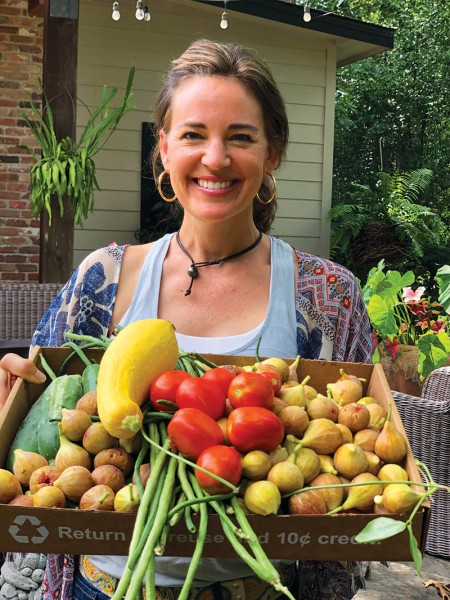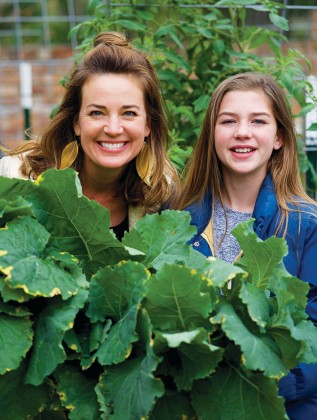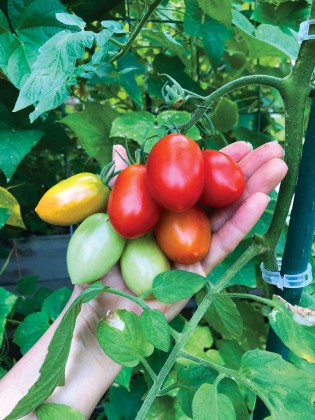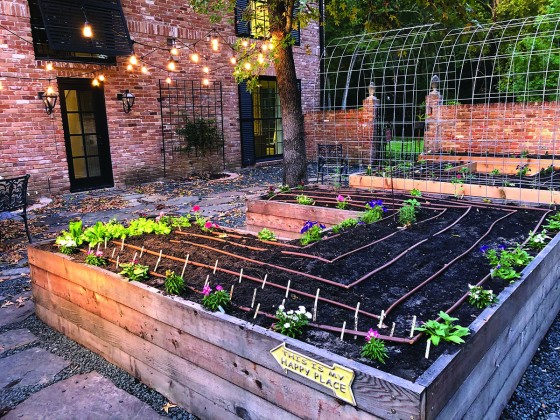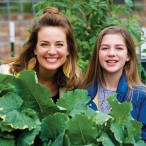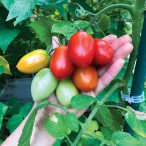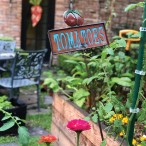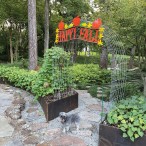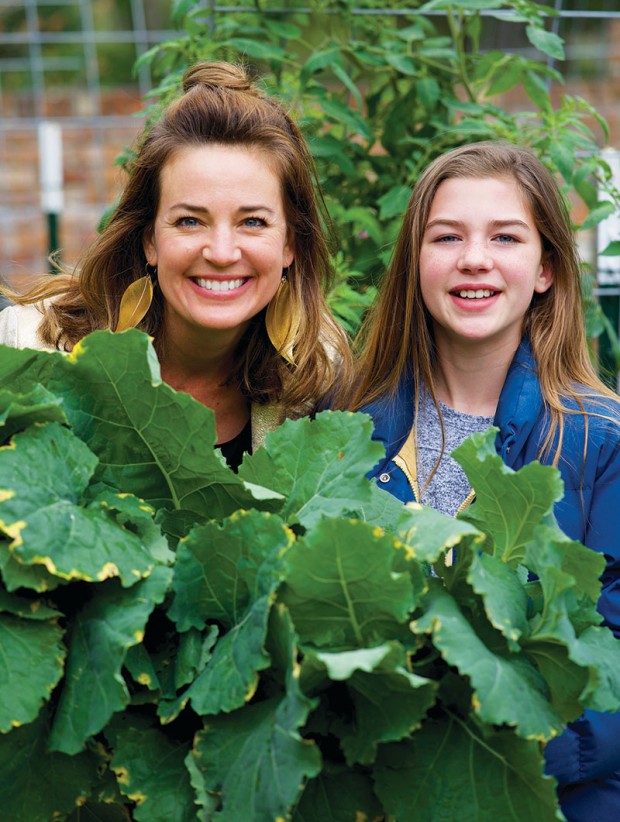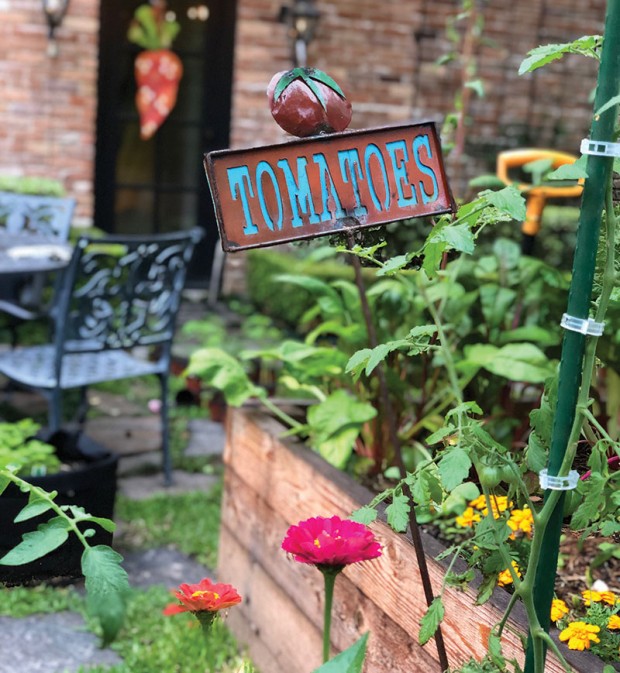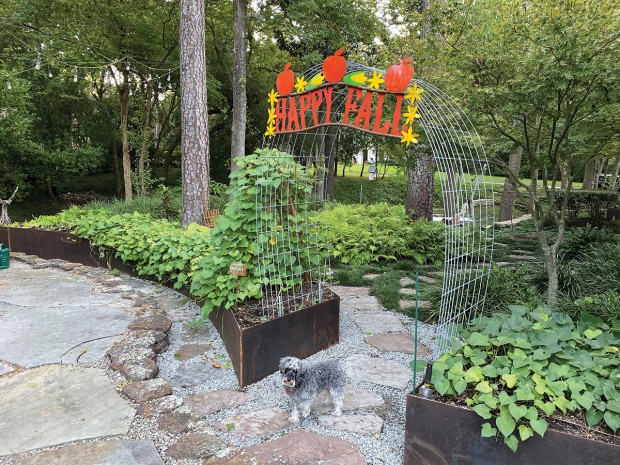Kitchen Garden
An edible little yard in the city

Green beans. Sugar-snap peas. Tomatoes of all sizes and hues. Six different kinds of frilly lettuce leaves. Kale. Arugula. Spinach. Okra. Depending on the season, carrots, potatoes, sweet potatoes, beets and turnips grow underground, with cabbage, broccoli, peppers, eggplant, squash, cauliflower and cucumbers above. Strawberries are in one window box, blackberries in another. There are several types of melons, of herbs, of fruit trees (kumquat, peach, pear, fig, meyer lemon, satsuma orange, even dragon fruit).
Where are you?
In Memorial, in the heart of Houston.
In Jill Oliver’s yard.
In her kitchen garden, to be precise.
And Jill will often be out there, planting seeds, transplanting seedlings, weeding, pruning, watering, composting, harvesting. She trains tomato plants, cucumbers and pole beans to grow up trellises and her kumquat trees to grow as espaliers, flat against a wall. One hot September afternoon, she was shading seedlings from the sun, while hummingbirds flitted from feeder to feeder. Her dog Domino, “my constant companion,” she says, is intensely interested in all she’s doing. “When I pick green beans, if I eat one, he gets one,” she said.
Jill estimates she spends about a half hour per day, morning and evening, in her kitchen garden. “It’s truly like going on a mini-vacation for me,” she said. “I’m in my own world for a time.”
A kitchen garden, as its name implies, is a garden usually right outside a kitchen. It’s traditionally small. Jill’s beds, she estimates, total about 400 square feet. Kitchen gardeners plant small quantities of many kinds of fruits, vegetables and herbs and, unlike an old-fashioned vegetable garden, with its plain old rows, kitchen gardens (or potagers, in French) are meant to be beautiful. This being the 21st century, Jill’s garden has its own Instagram page, oliver__garden__ (those are double underscores), with over 1,500 followers.

An early-morning shot of two of Jill Oliver's main beds with her garden's new party lights. (Photo: Jill Oliver)
Jill started her garden six years ago, when she asked her father to build her a raised garden bed for her birthday. Six months later, he built her a second one for Christmas. Growing up in Brenham, she remembers her parents always having a kitchen garden. Her father also grew pecan trees and still keeps bees. As a child, when it was time to pick peaches or when she was told to go pick all the strawberries, “at the time, it seemed like such a chore,” she remembered with a laugh, “but if you told me to do that now, I’d be skipping with joy.”
Don’t let the small size of a kitchen garden fool you. “You can get a pound of okra from three to four plants, easy,” said Jill. “I get pounds and pounds of tomatoes, and I had a basil plant so large this year, I could have provided basil to the whole neighborhood.” Currently, Jill’s goal (“I’m dreaming big,” she said) is to grow enough lettuce to have salads every day for six months. The garden determines, in part at least, what the Oliver family – Jill, husband Chris, sons Henry (a senior at Memorial) and Charlie (a sophomore at Memorial) and daughter Ivy (a sixth grader at Spring Branch) – eat for dinner, and Jill reports that they do eat more fruits and vegetables than they used to.
Yet, that isn’t the only reason Jill grows her garden.
“It may not put a huge dent in your grocery bill,” she said, “but there’s just so much satisfaction in serving something for dinner that you grew yourself.”
You can start your kitchen garden as small as some herbs growing in terra cotta pots, Jill said. Other easy plants to grow in containers are, she advises, peppers, tomatoes, lettuce, green beans and sugar-snap peas.
Jill’s garden now includes several raised garden beds, which are bottomless containers, hers made of either cedar or corten steel (weathered steel), set over gravel for drainage. Jill buys her soil. Although soil can be the biggest expense of a garden, she said, “investing in good soil is worth it. It’s everything.” Hers comes from a local company, Farm Dirt, that composts, using, in part, old, unsold produce it gets from Whole Foods, but she said there are many good local companies. Her garden is irrigated, using drip irrigation (basically hoses and tubes that run along the soil, outfitted with tiny emitters that allow water to ooze out). This is attached to her regular sprinkler system and is on a timer. “The garden is its own zone, so I can adjust it separately from the lawn,” she explained.
“There are so many lessons, about nature and patience and life, here,” she said, pointing out that, to germinate, to live, seeds have to be completely covered in dirt, in total darkness, and struggle toward the sun. Also, she pointed out that garden pests, which attack the weakest plants, are simply the start of the natural process of decomposition.
“A gardener is always exploring, always trying new things,” she said. “If something doesn’t make it, you plant it again. You plant seeds, knowing some will grow and some will not. The garden parallels life in a million ways.”
Editor's note: Check out "A Quick Appearance: Dragon Fruit Blossoms" by Andria Frankfort for more on Jill Oliver’s dragon fruit, which blooms just once a year.
To learn more
Here are some resources Jill Oliver recommends if you want to learn more about growing a kitchen garden.
Film: The Biggest Little Farm, a 2018 award-winning documentary.
Books:
All New Square Foot Gardening by Mel Bartholomew: “This is the first gardening book I ever read, and it’s a classic and wonderful,” said Jill.
Four-Season Harvest by Eliot Coleman
Epic Tomatoes by Craig LeHoullier
Texas Gardener’s Handbook, Dan Gill and Dale Groom
Texas Organic Vegetable Gardening by J. Howard Garrett and C. Malcolm Beck
The Vegetable Gardener’s Bible by Edward Smith
Complete Guide to Texas Gardening by Neil Sperry
Website: Texas A&M AgriLife Extension; “Awesome articles,” says Jill, an A&M alum.
Instagram accounts:
Jill’s own: @oliver__garden__
Nicole Burke (Jill’s friend and now employer): @gardenaryco; Nicole Burke started two companies helping people grow their kitchen gardens and has a book coming out this spring.
Kevin Espiritu: @epicgardening; he also wrote a book, Field Guide to Urban Gardening
Joe Lamp’l: @joegardener; he’s won an Emmy for his PBS series, Growing a Greener World, and has also written several books, including Green Gardener’s Guide.
@deannacat3; DeannaCat does grow her own cannabis, in case that might put some off, Jill warns, but she’s “super-inspirational” and “aaaahmazing.”
And four Instagrammers from Houston:
Mary Margaret Surdo: @fun_in_the_garden
Megan Frankum: @pickler.girl
YouTube channels:
Want more buzz like this? Sign up for our Morning Buzz emails.
To leave a comment, please log in or create an account with The Buzz Magazines, Disqus, Facebook, or Twitter. Or you may post as a guest.



